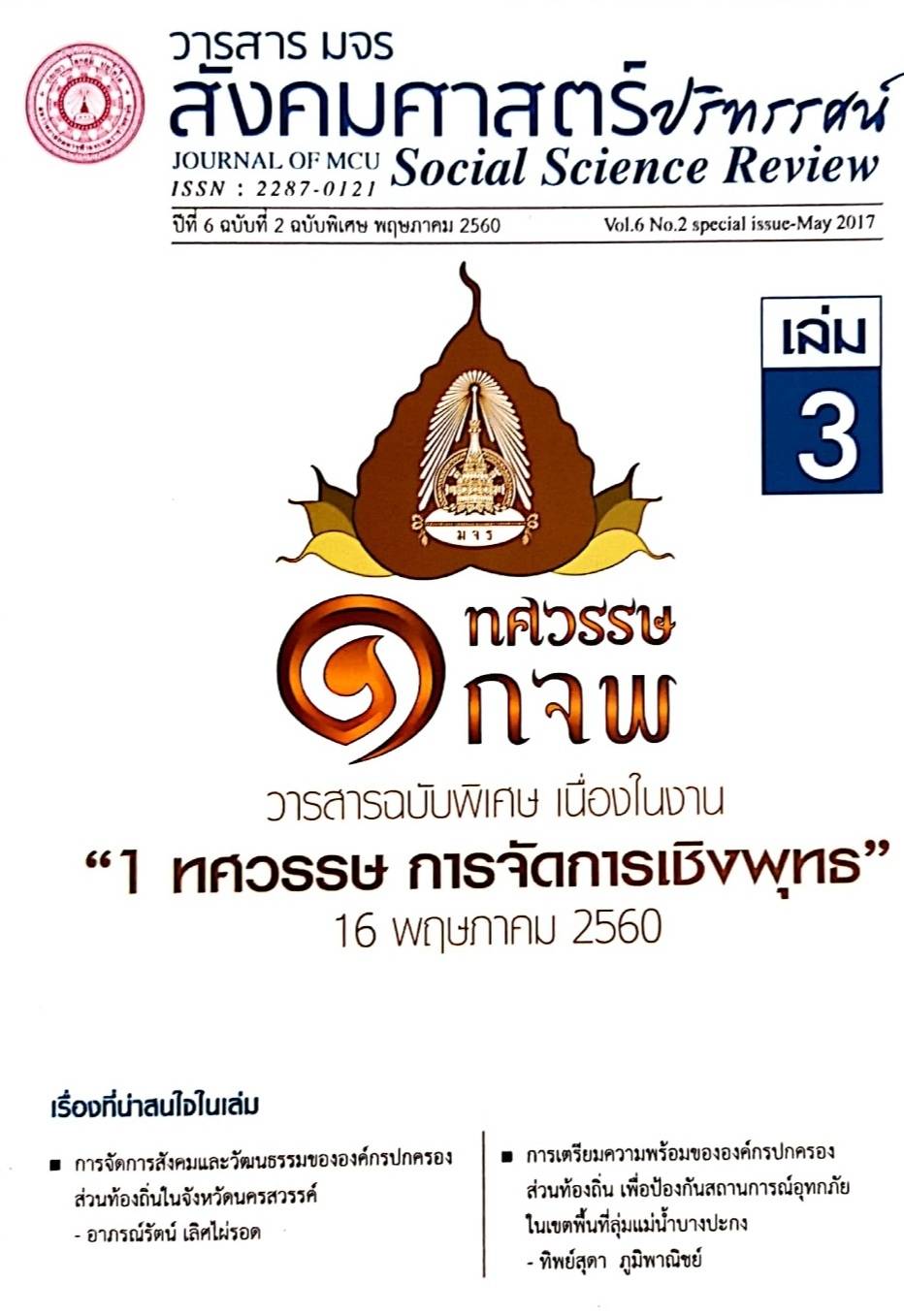การพัฒนารูปแบบการจัดการความรู้เพื่อเสริมสร้างสมรรถนะการใช้เทคโนโลยี สารสนเทศในศตวรรษที่ 21 ของครูโรงเรียนเอกชน จังหวัดสงขลา
คำสำคัญ:
การจัดการความรู้, รูปแบบ ,สมรรถนะการใช้สื่อเทคโนโลยีสารสนเทศในศตวรรษที่21บทคัดย่อ
การวิจัยครั้งนี้มีวัตถุประสงค์เพื่อการพัฒนารูปแบบการจัดการความรู้เพื่อเสริมสร้างสมรรถนะ
การใช้เทคโนโลยีสารสนเทศในศตวรรษที่ 21 ของครูโรงเรียนเอกชน จังหวัดสงขลาโดยมีวิธีดาเนินการวิจัย
4ขั้นตอนดังนี้ ขั้นที่1)การกาหนดกรอบแนวคิดในการวิจัย ขั้นที่2)การศึกษาสภาพปัจจุบันปัญหาและ
ความต้องการเกี่ยวกับการจัดการความรู้เพื่อเสริมสร้างสมรรถนะการใช้เทคโนโลยีสารสนเทศในศตวรรษที่
21 ของครูโรงเรียนเอกชน จังหวัดสงขลา ขั้นที่3)การสร้างรูปแบบการจัดการความรู้เพื่อเสริมสร้าง
สมรรถนะการใช้เทคโนโลยีสารสนเทศในศตวรรษที่ 21 ของครูโรงเรียนเอกชน จ.สงขลา ขั้นที่4) การ
ประเมินรูปแบบการจัดการความรู้การจัดการความรู้เพื่อเสริมสร้างสมรรถนะการใช้เทคโนโลยีสารสนเทศ
ในศตวรรษที่ 21 ของครูโรงเรียนเอกชน จ.สงขลา กลุ่มตัวอย่างที่ใช้ในการวิจัยได้แก่1)เอกสารตาราและ
งานวิจัยที่เกี่ยวกับพัฒนารูปแบบการจัดการความรู้ในโรงเรียน2)โรงเรียนเอกชนในจังหวัดสงขลา 162
โรงเรียน สุ่มตัวอย่างอย่างง่ายได้กลุ่มตัวอย่าง จานวน113โรงเรียนและ 3)ผู้ทรงคุณวุฒิด้านการจัดการ
ความรู้ ผู้ทรงคุณวุฒิด้านการบริหารการศึกษา และผู้ทรงคุณวุฒิด้านเทคโนโลยีสารสนเทศจานวน9คน
เครื่องมือที่ใช้ในการเก็บรวบรวมข้อมูลได้แก่ แบบสอบถาม แบบบันทึกข้อมูลการสนทนากลุ่ม (focus
group discussion )และแบบประเมินความเหมาะสมและความเป็นไปได้สถิติที่ใช้ในการวิเคราะห์ข้อมูล
คือค่าความถี่ค่าร้อยละค่าเฉลี่ยส่วนเบี่ยงเบนมาตรฐานค่ามัธยฐานและค่าพิสัยระหว่างควอไทล์ ผลการวิจัยพบว่า
1. ผลการวิเคราะห์สภาพปัจจุบันและความต้องการเกี่ยวกับการจัดการความรู้เพื่อเสริมสร้าง
สมรรถนะการใช้เทคโนโลยีสารสนเทศในศตวรรษที่ 21 ของครูโรงเรียนเอกชน จ.สงขลา พบว่าสภาพการ
จัดการความรู้ ในปัจจุบันทุกขั้นตอนอยู่ในระดับปานกลาง ในขณะที่ความต้องการทุกขั้นตอนอยู่ในระดับ
มาก และเมื่อพิจารณาลาดับความสาคัญของความต้องการจัดการความรู้ในขั้นต่าง ๆ พบว่า ผู้ตอบ
แบบสอบถามมีความต้องการในขั้นการเข้าถึงความรู้ และการนาความรู้ไปใช้ มากที่สุด
2. ผลการสร้างรูปแบบการจัดการความรู้เพื่อเสริมสร้างสมรรถนะการใช้เทคโนโลยีสารสนเทศ
ในศตวรรษที่ 21 ของครูโรงเรียนเอกชน จังหวัดสงขลา ลักษณะรูปแบบเป็นMacro Flowchart และผัง
การไหลของงานแบบหน้ากระดาน( Deployment flowchart ) มี6 ขั้นตอน 47 กิจกรรม ดังนี้ 1.การ สร้างและแสวงหาความรู้ (Knowledge Creation and Acquisition) ประกอบด้วย 6 กิจกรรม 2. การ
เข้าถึงความรู้ (Knowledge Access) ประกอบด้วย 9 กิจกรรม 3.การแลกเปลี่ยนความรู้ (Knowledge
Sharing) ประกอบด้วย 10 กิจกรรม 4.การประมวลและกลั่นกรองความรู้ (Knowledge Codification
and Refinement) ประกอบด้วย 5 กิจกรรม 5.การจัดเก็บความรู้ (Knowledge Organization)
ประกอบด้วย 7 กิจกรรม และขั้นที่ 6. การนาความรู้ไปใช้ (Knowledge adoption ประกอบด้วย 10
กิจกรรม
เอกสารอ้างอิง
กรุณพล พราหมเภทย์.(2557) รูปแบบการจัดการความรู้เพื่อการพัฒนาครู : กรณีศึกษากลุ่มโรงเรียนน้าผุดโพธาราม สานักงานเขตพื้นที่การศึกษาประถมศึกษาตรัง เขต 1.วิทยานิพนธ์ (ศษ.ด. (การบริหารการศึกษา)มหาวิทยาลัยสงขลานครินทร์.ปัตตานี:มหาวิทยาลัยสงขลานครินทร์.
บดินทร์ วิจารณ์. (2550). การจัดการความรู้..สู่ปัญญาปฎิบัติ.พิมพ์ครั้งที่(3) กรุงเทพมหานคร : ธรรกมลการพิมพ์.
บุญชม ศรีสะอาด. (ม.ป.ป.) สืบค้นเมื่อ 24 มีนาคม 2553. จาก http://www.watpon.com/boonchom/development.pdf
ปรีชา วิหคโต. (2557).การพัฒนารูปแบบการจัดการความรู้ในโรงเรียนเขตพื้นที่การศึกษาเชียงใหม่เขต 6. วารสารวิชาการคุณภาพชีวิตกับกฎหมายมหาวิทยาลัยมหิดล .ปีที่ 10 ฉบับที่ 3 ตุลาคม-ธันวาคม 2557.เล่มที่ 4 ฉบับที่ 1 หน้า 225. 339-347
ปรีชา วิหคโต (2557).การพัฒนารูปแบบการการจัดการความรู้ในโรงเรียนสังกัดสานักงานเขตพื้นที่การศึกษาประถมศึกษาแม่ฮ่องสอน เขต 1. วารสารวิชาการคุณภาพชีวิตกับกฎหมายมหาวิทยาลัยมหิดล .ปีที่ 10 ฉบับที่ 3 ตุลาคม-ธันวาคม 2557.เล่มที่ 5 ฉบับที่ 2 หน้า 69. 56-64
ประพนธ์ ผาสุกยืด. (2547) การจัดการความรู้ฉบับมือใหม่หัดขับ. กรุงเทพฯ : ใยไหม.
ประสิทธิ์ ทีฆพุฒิ และ ครรชิต มาลัยวงศ์.(2549) การจัดการเทคโนโลยีสารสนเทศ.กรุงเทพฯ :ดอกหญ้ากรุ๊ป.
ปาริชาติ เภสัชชา ดร.เกตุมณี มากมี สุเทพ พงศ์ศรีวัฒน์ดร.เรืองวิทย์ นนทภา. การพัฒนาสมรรถนะครูผู้นำ ด้านการใช้เทคโนโลยีสารสนเทศและการสื่อสาร ในการจัดกิจกรรมการเรียนรู้ศตวรรษที่ 21 วารสารบัณฑิตศึกษา ปีที่ 12 ฉบับที่ 59 ตุลาคม-ธันวาคม 2558
ปิยะนาถ บุญมีพิพิธ. (2551). การพัฒนารูปแบบการจัดการความรู้ของสถานศึกษา.ดุษฎีนิพนธ์ปริญญาปรัชญาดุษฎีบัณฑิต.สาขาวิชาการบริหารการศึกษา:มหาวิทยาลัยศิลปากรพระราชบัญญัติ
โรงเรียนเอกชน พ.ศ.2550 แก้ไขเพิ่มเติม (ฉบับที่ 2 ) พ.ศ. 2554 กรุงเทพมหานคร: โรงพิมพ์องค์การรับส่งสินค้าและพัสดุภัณฑ์ (รสพ)>
พรพิมล หรรษาภิรมย์โชค.(2550) การพัฒนารูปแบบการจัดการความรู้สาหรับภาครัฐ. วิทยานิพนธ์ครุศาสตรดุษฎีบัณฑิต สาขาวิชาเทคโนโลยีและสื่อสารการศึกษา:จุฬาลงกรณ์มหาวิทยาลัย.
พรธิดา วิเชียรปัญญา.(2547)การจัดการความรู้: พื้นฐานและการประยุกต์ใช้ กรุงเทพ : เอ็กซ์เปอร์เน็ท.
พรรณี สวนเพลง. (2552). เทคโนโลยีสารสนเทศและนวัตกรรมสาหรับการจัดการความรู้. กรุงเทพฯ: ซีเอ็ด ยูเคชั่น.
ภาสกร เรืองรอง และคณะ เทคโนโลยีการศึกษากับครูไทยในศตวรรษที่ 21 Panyapiwat JournalVol.5 Special Issue May 2014
ภรณี หลาวทอง,โกเมศ จันทรสมโภชน์ , เฉลิมพล คงจันทร์, สหเทพ ค่าสุริยา และปิยะ แก้วบัวดี.การพัฒนาสมรรถนะด้านเทคโนโลยีสารสนเทศและการสื่อสารของอาจารย์ผู้สอนสัง กัดมหาวิทยาลัยเทคโนโลยีราชมงคลอีสาน,บทคัดย่อ วารสารวิชาการและวิจัย มทร.พระนครฉบับพิเศษ การประชุมวิชาการมหาวิทยาลัยเทคโนโลยีราชมงคลครั้งที่5.
มงคลชัย วิริยะพินิจ.(2556)องค์กรแห่งการเรียนรู้และการจัดการความรู้ภาควิชาการ กรุงเทพฯ :สานักพิมพ์ศ่องสยาม.
สานักงานคณะกรรมการส่งเสริมการศึกษาเอกชน, กระทรวงศึกษาธิการ.(2558). รายงานผลการประเมินโรงเรียนเอกชนประเภทสามัญศึกษาที่มีคุณภาพสู่มาตรฐานสากล.กรุงเทพมหานคร.
สานักงานเลขาธิการสภาการศึกษา. (2552) การวิจัยและพัฒนานวัตกรรมการเพิ่มประสิทธิภาพขององค์กรทางการศึกษาด้วยการจัดการความรู้. นนทบุรี:โรงพิมพและทาปกเจริญผล.
สานักพัฒนาผู้ฝึกและเทคโนโลยีการฝึก,กรมพัฒนาฝีมือแรงงาน. (2558).การจัดการองค์ความรู้ (Knowledge Management - KM).กรุงเทพมหานคร.
Allee, V. (2003). The future of knowledge: Increasing prosperity throughvalue network. Amsterdam: Butterworth-Heinemann A.S.Arul Lawrence and K.Veena. IMPROVING TEACHER COMPETENCY THROUGH ICT. http//www.academia.edu
Anantatmula V.( 2004). Advancing Project Management Tools beyond Quantitative Methods.Presented at the 18th IPMA International Congress on Project Management,Budapest: 19-20 June 2004.
Bardo, Hartman. โครงสร้างของรูปแบบ. 2004. <http://www.trglobec.go.th/newfilep30346241849pdf> 12 September 2013.
Bokowitz, W. and R. Williams. The Knowledge Management Field Book.London : Practice Hall, 2000.
Choo, Chum Wei. (2000, April). “Working Knowledge : How Organizations Manage What They Know.” Stepping into the New Millennium : Challenges for Libraries & Information Professionals. Congress of Southeast Asian Librarians, Singapore.11:26-28.
Davenport, Thomas H.; & Gilbert, Probst. (2002). Siemen ‘s Knowledge Journey. In Knowledge Management Case Book. pp.10-19. Berlin: John Wiley $ Son.fatunee . เทคนิคการวิจัยแบบสนทนากลุ่ม (Focus Group Discussion) . แหล่งที่มา: http://fatuneemam.blogspot.com/2010/11/focus-group-discussion_06.html. 6 สิงหาคม 2560
Gilbert Probst, Steffen Raub, and Kai Romhardt.Managing knowledge : building blocks for success / New York : John Wiley & Sons, c2000.Management Functions and their Managerial Performances,” Journal of Knowledge Management Practice.7(2) : 78 ; June, 2006.
ดาวน์โหลด
เผยแพร่แล้ว
รูปแบบการอ้างอิง
ฉบับ
ประเภทบทความ
สัญญาอนุญาต
ลิขสิทธิ์ (c) 2020 วารสาร มจร สังคมศาสตร์ปริทรรศน์

อนุญาตภายใต้เงื่อนไข Creative Commons Attribution-NonCommercial-NoDerivatives 4.0 International License.
เพื่อให้เป็นไปตามกฎหมายลิขสิทธิ์ ผู้นิพนธ์ทุกท่านต้องลงลายมือชื่อในแบบฟอร์มใบมอบลิขสิทธิ์บทความให้แก่วารสารฯ พร้อมกับบทความต้นฉบับที่ได้แก้ไขครั้งสุดท้าย นอกจากนี้ ผู้นิพนธ์ทุกท่านต้องยืนยันว่าบทความต้นฉบับที่ส่งมาตีพิมพ์นั้น ได้ส่งมาตีพิมพ์เฉพาะในวารสาร มจร สังคมศาสตร์ปริทรรศน์ เพียงแห่งเดียวเท่านั้น หากมีการใช้ภาพหรือตารางหรือเนื้อหาอื่นๆ ของผู้นิพนธ์อื่นที่ปรากฏในสิ่งตีพิมพ์อื่นมาแล้ว ผู้นิพนธ์ต้องขออนุญาตเจ้าของลิขสิทธิ์ก่อน พร้อมทั้งแสดงหนังสือที่ได้รับการยินยอมต่อบรรณาธิการ ก่อนที่บทความจะได้รับการตีพิมพ์ หากไม่เป็นไปตามข้อกำหนดเบื้องต้น ทางวารสารจะถอดบทความของท่านออกโดยไม่มีข้อยกเว้นใดๆ ทั้งสิ้น





